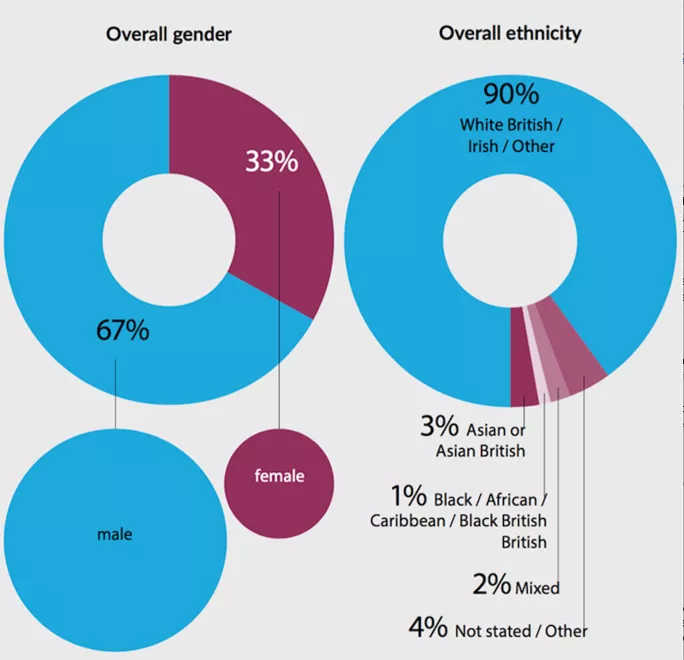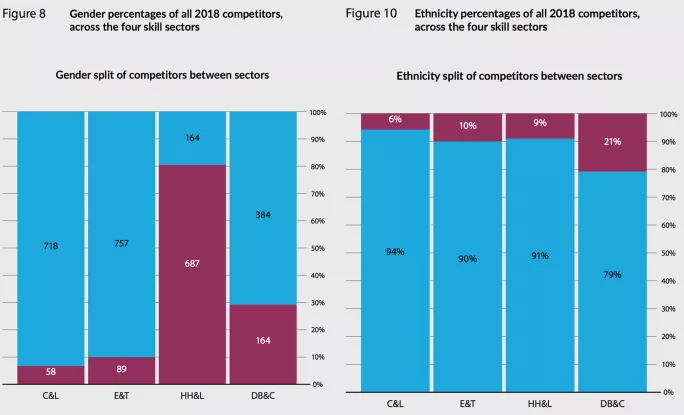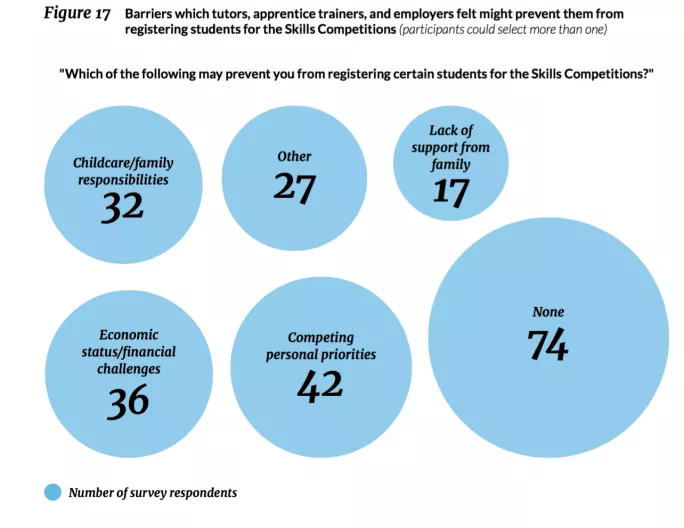- Home
- 90% white, 67% male: The WorldSkills diversity crisis
90% white, 67% male: The WorldSkills diversity crisis

WorldSkills UK’s lack of diversity has been laid bare in a groundbreaking new report published today.
The report, shared exclusively with Tes, shines a light on diversity and inclusion of the competitors, training managers and judges who took part in the national and regional WorldSkills UK competitions in 2018.
The report, produced by the Social Innovation Partnership, reveals that 67 per cent of the WorldSkills UK competitors in 2018 were male, and 90 per cent of competitors were White British or Irish. Just 5 per cent of competitors registered as having disabilities, mental health conditions or SEND.

Background: Why more diversity would make WorldSkills even better
More: WorldSkills UK diversity report: 6 things we've learnt
News: Should colleges be punished over WorldSkills diversity?
WorldSkills UK’s Neil Bentley-Gockmann told Tes that the organisation was determined to do better.
“This report is us holding a mirror up to ourselves and saying, we've got to do better. It’s saying, let's just look at what the challenges are and publish it. I really believe that being transparent about the challenges holds everybody's feet to the fire to move things on and get stuff done.”
A total of 316 registrants, 14 training managers, 50 judges, 6 performance coaches, 28 college principals and 173 trainers and tutors were surveyed. Overall, the research showed that WorldSkills UK competitors tend to be male, and White British or Irish.
The data also looked at each of the skills sectors individually. The proportion of female competitors varied hugely, from 7.4 per cent in construction and infrastructure (C&L) and 10 per cent in engineering and technology (E&T) up to 42 per cent in digital, business and creative (DB&C) and 80 per cent in health, hospitality and lifestyle (HH&L).
In terms of ethnicity, the proportion of white British and Irish competitors varied from 6 per cent in C&L to 21 per cent in DB&C.

Psychologist and former professional basketball player John Amaechi sat on the WorldSkills advisory board for the research. He said that BAME students were not coming through the competitions because of racial stereotyping and bias and called for processes to be more transparent.
He said: "Leaving who is put forward to WorldSkills up to a tutor automatically brings with it a sense of bias and a sense of: who is the candidate that fits? Who is the candidate that I am most comfortable with? All of these things will create an imbalance and potential spots for bias.”
He added: “If you look around your sector and see that you are a face that fits, you will take a chance... If you look around and realise you’re a great black unicorn in the midst of everyone else and there is only one face like yours, there’s a different risk profile. Why stick your head above the parapet if you already don’t fit?”
Financial barriers to WorldSkills
The report also shines a light on the financial barriers that disadvantaged young people face to the competitions. Some 60 per cent of tutors and employers said they did not agree that their most skilled students were always able or willing to take part, suggesting that there were practical or motivational barriers. Some 23 per cent of tutors and trainers agreed that students’ financial difficulties could prevent them from being able to participate.

Elizabeth Forkuoh, a former WorldSkills competitor in restaurant service, came to the UK from Italy when she was 15 years old.
She started secondary school in Wales unable to speak English and, as her skill set developed and she showed a passion for hospitality, her tutor encouraged her to apply for WorldSkills UK competitions.
She said that while she was training for the 2018 Abu Dhabi competitions, she received financial support from her provider, Coleg Sir Gar.
She said: “I had to take a lot of time off work, so I wasn’t able to earn any money. Instead, the college paid me £50 per day for attending this training. Without that money, it would have been difficult for me to carry on depending on how much the cost would have been. It’s definitely something that encourages you to do it more, knowing you can do it freely without worrying about anything.
“I think that I took the fact that my costs were being paid for granted. If that wasn’t provided, I wouldn't even be here.”
Explicit positive action
The report recommends that WorldSkills UK focusses on five areas to improve its diversity:
- Reaching and appealing to diverse individuals.
- Tackling stereotypes and preconceptions.
- Improving competitor support and reducing barriers to entry.
- Increasing and appreciating diversity and inclusion within WorldSkills UK, the skills competitions and its partners.
- Forming a clear vision and narrative around diversity and inclusion across WorldSkills UK and its partners.
Mr Bentley-Gockmann said: “My plea to partners in the sector is to help us do this. Any organisation, any business, anybody will tell you that when you start off on this journey do not expect things to turn around quickly.
“We are looking at setting measurement targets for ourselves that are over the next five years to see how we're doing. I say targets because I really believe that setting targets for ourselves, and if we hit the target, that’s brilliant, but if not, why not, and let’s understand why."
WorldSkills UK is also looking at increasing the visibility of diverse role models across all of its events. In 2019, it launched diversity and inclusion heroes awards, which Bentley-Gockmann said will be expanded this year.
He said: “The core message there is, you can succeed whoever you are, whatever your background is, and that's what we've got to get across. [When speaking to one former competitor], I said to her: do you feel like a role model? But she didn't want to be labelled as a role model and yet role modelling is so important. Her point was: 'We just need to see people like me.'"
Mr Amaechi said that while role modelling is important, making operational changes was more critical.
He said: "As black gay man, if I’d relied on role models to get to where I am, then I would still be where I was because there aren’t any.
"There will always be opposition to changing the system but you can rely on operational changes, you can rely on reducing the wiggle room for interpretation in policy, you can rely on changing criteria to make sure they are objective, not gendered, not racist, so that people can pass through those gates without someone interfering or intervening."
A sector-wide issue
The research also looks at the diversity of the FE sector. The data shows that ethnic minority students make up 24 per cent of students in colleges and apprenticeships, with 17 per cent having a learning disability or difficulty.
Mr Bentley-Gockmann said that it was time to have a sector-wide discussion about inclusion and diversity.
He said: “It came out loud and clear in the analysis and in the advisory group we had that we are a microcosm of the whole system. We can’t do this on our own. So what are we going to do about it? The absence of debate in the FE sector around improving inclusion and promoting diversity is quite stark. There's not a lot of debate about it and not a lot of people talking about it. I want this report to start a wider discussion about diversity and inclusion."
WorldSkills UK competitions 2020 are open from registration until 2 April. To enter click here.
Register with Tes and you can read two free articles every month plus you'll have access to our range of award-winning newsletters.
Keep reading with our special offer!
You’ve reached your limit of free articles this month.
- Unlimited access to all Tes magazine content
- Save your favourite articles and gift them to your colleagues
- Exclusive subscriber-only stories
- Over 200,000 archived articles
- Unlimited access to all Tes magazine content
- Save your favourite articles and gift them to your colleagues
- Exclusive subscriber-only stories
- Over 200,000 archived articles



